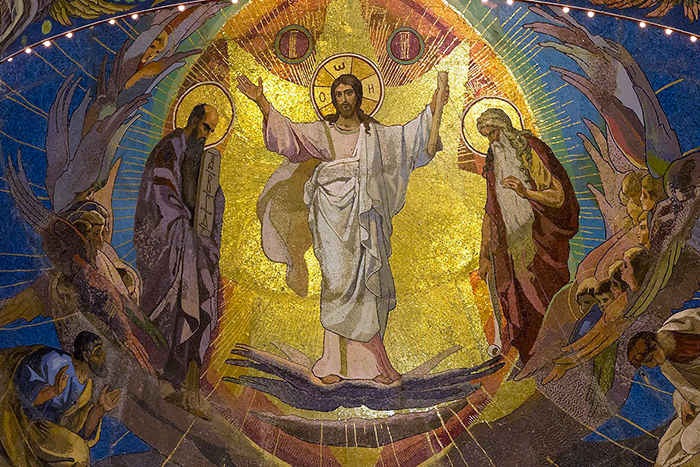
Today we begin the 3rd week in our Lenten journey. Today, our attention is on the Transfiguration of Jesus. The central point of the event of Transfiguration is a mountain – Going up the mountain – The moment of grace on top of the mountain – Coming down from the mountain top after that experience.
First, let me share a story: A young priest was paying his first pastoral visit to a nursing home in a new parish. He was running late. He had skipped lunch and was hungry. As he entered the room of an elderly woman and introduced himself, he couldn’t help but notice a large bowl of peanuts sitting on her nightstand. Although it was not his normal practice, he excused himself and said, “Ma’am, do you mind if I have some of those peanuts?” “Of course, Father,” she said with hospitality. “Help yourself.” So, he took some, and kept eating handful after handful as the lady rambled on about her connection to the parish. By the time he caught himself, he realized that he had eaten almost all the peanuts in the bowl. Somewhat embarrassed, he took the bowl and extended it to the woman saying, “Excuse my rudeness. Would you like some of these peanuts?” “Oh, no, Father,” she said with a smile. “I don’t like peanuts. I just like the chocolate coating. After I have sucked that off, I put the peanuts in that bowl.”
Things are often different than they seem. It is amazing how often we walk around with a false picture of who we are and who other people are. We can know someone for many years and suddenly find out that there is a part of that person — a gift, a flaw, a dream — to which we were blind. Someone that we always trusted can turn out to be deceitful. Someone we never understood can suddenly step forward as a friend. And when this new truth hits us, it can confuse us and disorientate us. This is what happens to the disciples in today’s gospel. In the Transfiguration they see a new truth about Jesus.
What difference would it make to us if we could see and hear our Lord Jesus Christ praying for us? Would we be encouraged to know that God knows all about our problems, that we are not facing the challenges of life alone? Would our problems immediately begin to melt away since we know that God’s own Son is on our side? Would that vision inspire us to take the bold step of faith we have been afraid to take, knowing that with Christ on our side we are safe? Yet we do not need to hear with our physical ears Christ praying for us. We can hear it with our ears of faith. For “faith is the assurance of things hoped for, the conviction of things not seen.”
Sometimes we say, “It’s impossible.” But Jesus says in Luke, “Things that are impossible for men are possible for God.”
The transfiguration of Jesus in our Gospel was not just about Jesus. I would like to see it as a vision of the glorious future to which we are all called. But we encounter problems and negativities, and we get hurt going through life. Then we have the choice to either say and do negative things, or we can choose to remember who we really are – brothers and sisters of Jesus, sons and daughters of God since baptism – or that the glory of the transfigured Jesus awaits each of us.
The disciples who experienced Jesus’ Transfiguration had to come down the mountain and return to normality, but they remembered the Transfiguration. Like them, we live in normality but we believe and know that God has destined great things for us. We say that the Transfiguration prepared the disciples for the scandal of the Cross. Celebrating Jesus’ Transfiguration early in Lent reminds us of what comes after the Cross, because it reminds us of the glory of Jesus, risen from the dead.
Luke tells us that “The disciples kept silent and, in those days, told no one any of the things they had seen.” So too, our Lenten experience is meant to offer us the possibility of experiencing God more deeply, and to carry that experience to our encounter with other people. The effect on the Apostles wasn’t that, from this moment on, they were only faithful and never wavered. God’s grace, always available to each of us, doesn’t simply override our human nature. The Apostles were still human, and despite this and many other privileged encounters with God, they were still capable of giving in to fear and not turning to the help of God’s grace.
In our own lives of faith, we can experience something very similar. God is revealed to us in some unmistakable way. We encounter God and all doubt is cast aside. Then, almost in the blink of an eye, we find ourselves struggling once again and unsure of whether God is even there. It’s in those times, down in the valleys, that we must remember the experience of the mountain top.
Today, as at every Sunday liturgy, Jesus comes to us in a way that surpasses even his Transfigured human body – in the Eucharist. The difficulty is that we (sometimes) can’t see this reality as the Apostles did for that short moment. We can’t look at the Eucharist with our eyes and comprehend its reality because it is beyond our ability to understand. We must see through the eyes of our faith, which tell us that what Jesus promised, he will provide. When we see that reality, then we, like Peter, will also say, “Master, it is good for us to be here.”
–Dcn. Terry Murphy

